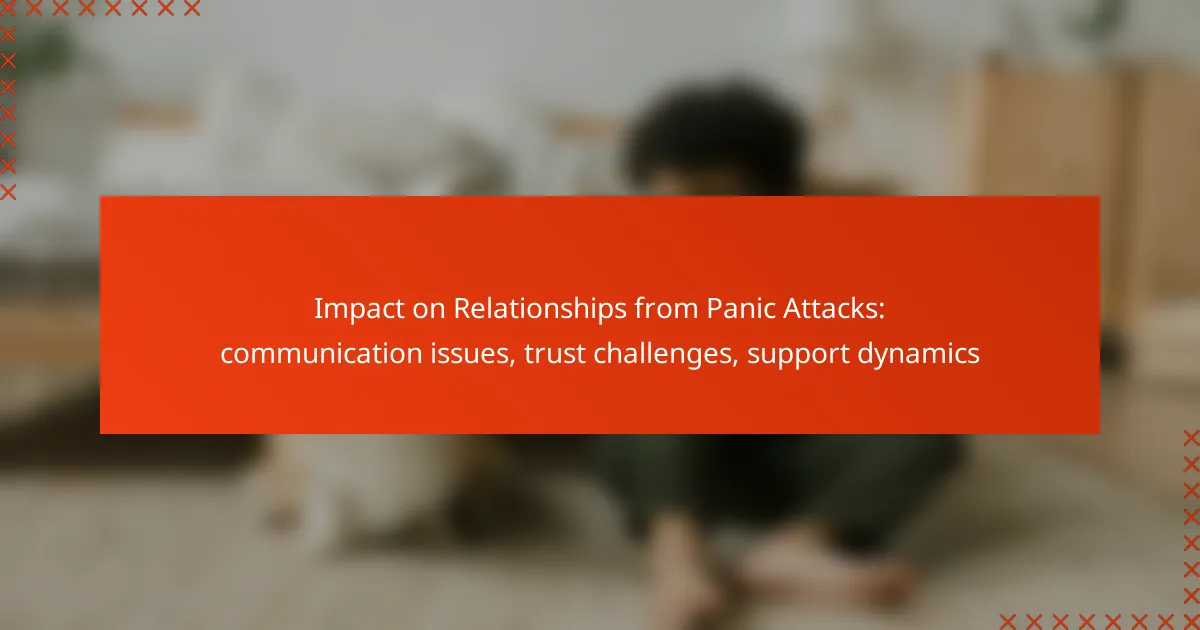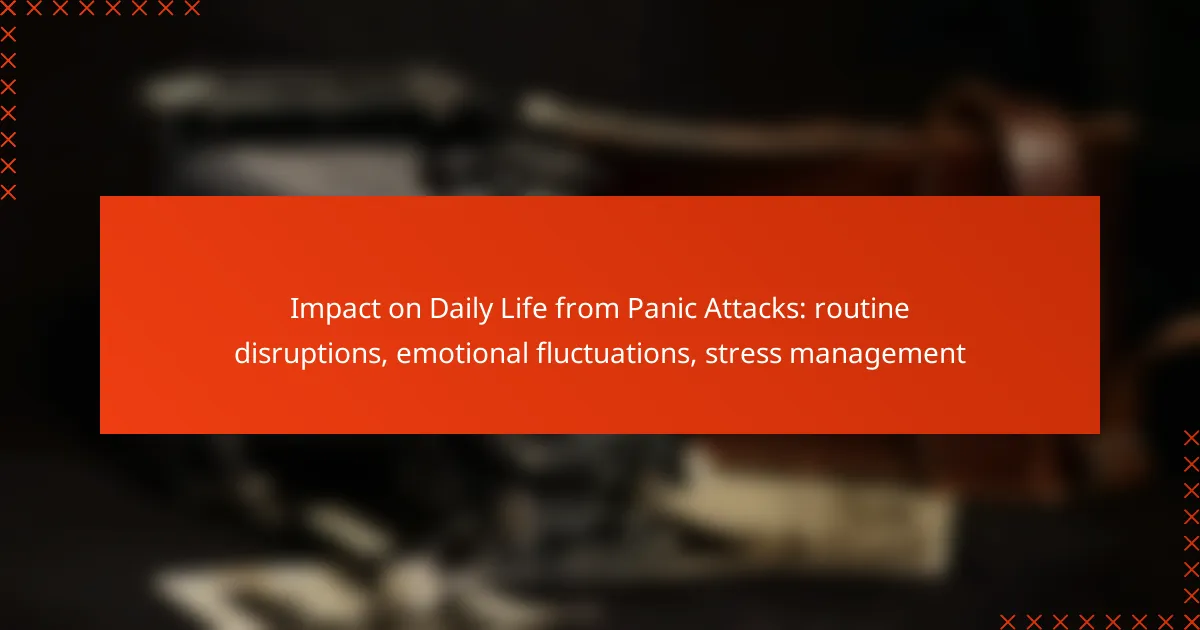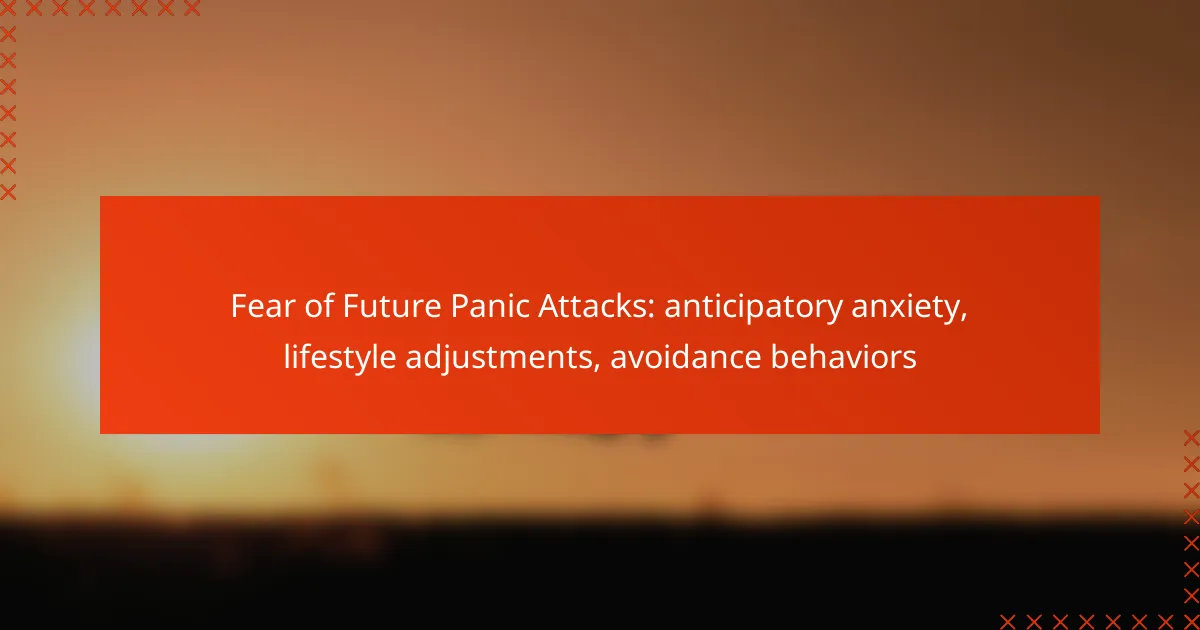Panic attacks can profoundly affect relationships by creating barriers to effective communication and trust. The anxiety and fear that accompany these episodes often lead to misunderstandings, making it difficult for partners to connect and support one another. By fostering empathy and open dialogue, couples can navigate the challenges posed by panic attacks and strengthen their bond.
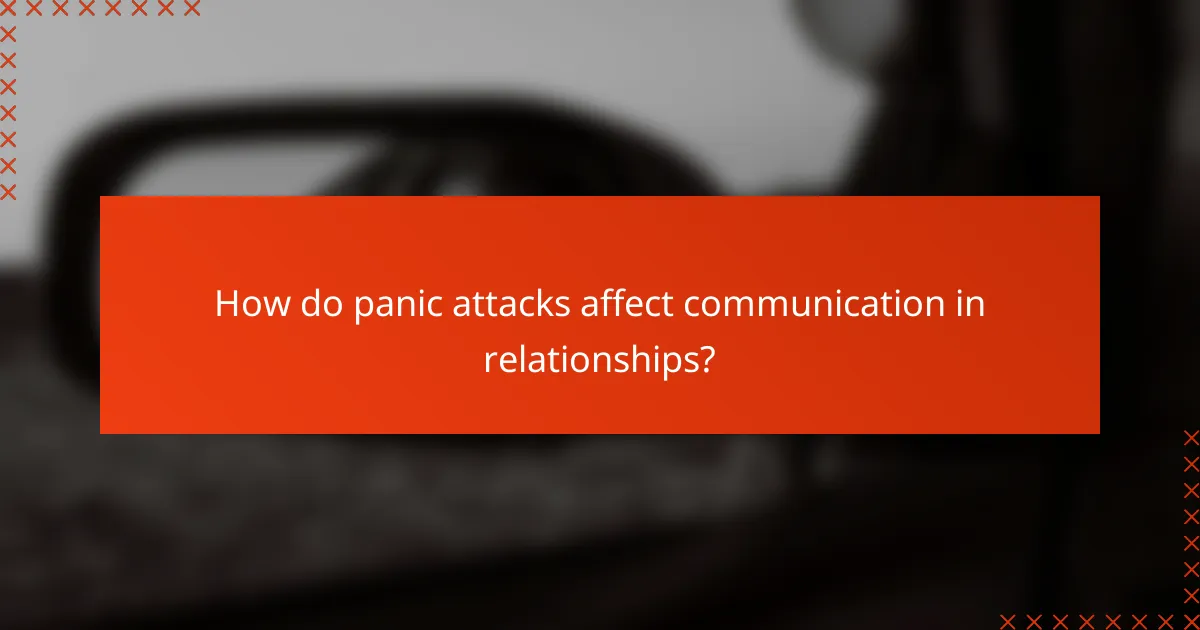
How do panic attacks affect communication in relationships?
Panic attacks can significantly disrupt communication in relationships, leading to misunderstandings and emotional strain. The fear and anxiety associated with these episodes often hinder open dialogue, making it challenging for partners to connect effectively.
Increased misunderstandings
Panic attacks can lead to increased misunderstandings between partners, as one may misinterpret the other’s reactions during an episode. For instance, if one partner feels overwhelmed and withdraws, the other might perceive this as disinterest or rejection, escalating tensions.
To mitigate misunderstandings, it’s essential for both partners to discuss their feelings and experiences openly. Establishing a safe space for these conversations can help clarify intentions and reduce assumptions that may arise during panic episodes.
Difficulty expressing feelings
Individuals experiencing panic attacks often struggle to articulate their emotions, which can create a barrier in relationships. The overwhelming nature of panic can lead to a shutdown of communication, making it hard to share thoughts or feelings about the experience.
Encouraging open dialogue about feelings in a calm setting can help. Partners should practice patience and allow each other the time needed to express themselves without pressure, fostering a more supportive environment.
Heightened emotional responses
Panic attacks can trigger heightened emotional responses, leading to reactions that may seem disproportionate to the situation. This can create a cycle of anxiety, where one partner’s fear exacerbates the other’s stress, complicating communication further.
To address this, partners should work on recognizing emotional triggers and developing coping strategies together. Techniques such as deep breathing or grounding exercises can help both partners manage their responses, promoting a more constructive dialogue during challenging moments.
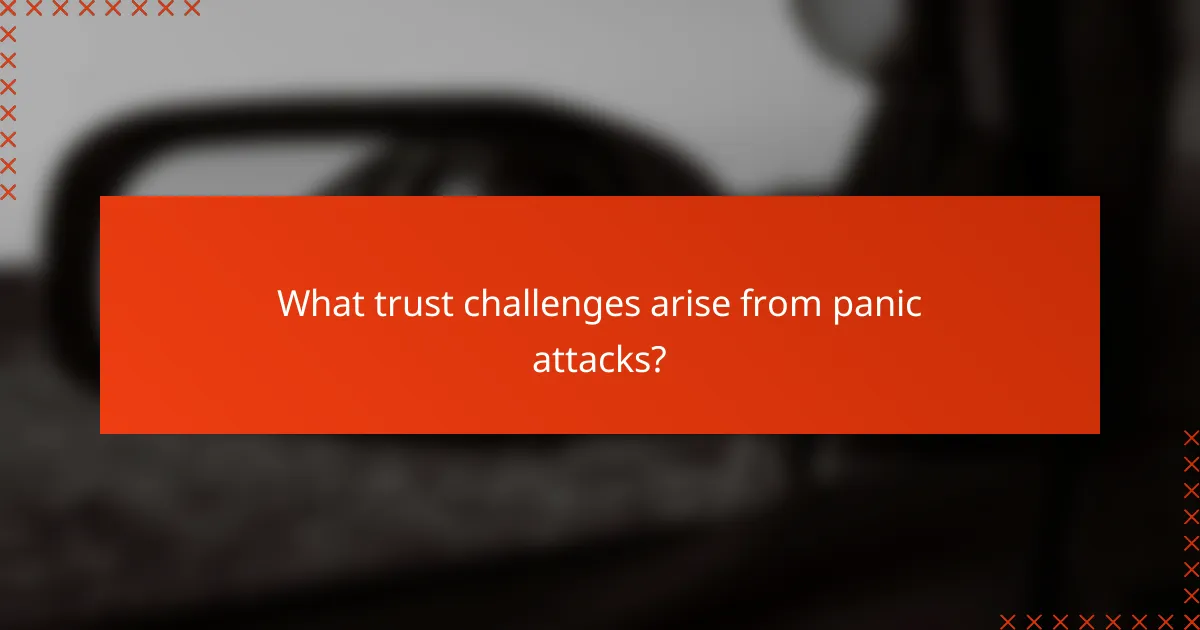
What trust challenges arise from panic attacks?
Panic attacks can create significant trust challenges in relationships, primarily due to the unpredictability of the episodes and the emotional fallout that follows. Partners may struggle to understand the triggers and responses, leading to feelings of insecurity and doubt.
Fear of abandonment
Fear of abandonment often surfaces when one partner experiences panic attacks. The individual suffering may worry that their episodes will drive their partner away, creating a cycle of anxiety and mistrust. This fear can lead to clinginess or withdrawal, complicating the relationship further.
Inconsistent behavior
Panic attacks can lead to inconsistent behavior, making it difficult for partners to predict reactions. One moment, the affected individual may seem fine, while the next, they could be overwhelmed by anxiety. This unpredictability can frustrate partners, who may feel unsure about how to support their loved one effectively.
Impact on reliability
Reliability can be compromised when panic attacks interfere with daily activities and commitments. The affected individual might cancel plans or struggle to fulfill responsibilities, which can erode trust over time. Partners may begin to question the reliability of their loved one, leading to increased tension and resentment.
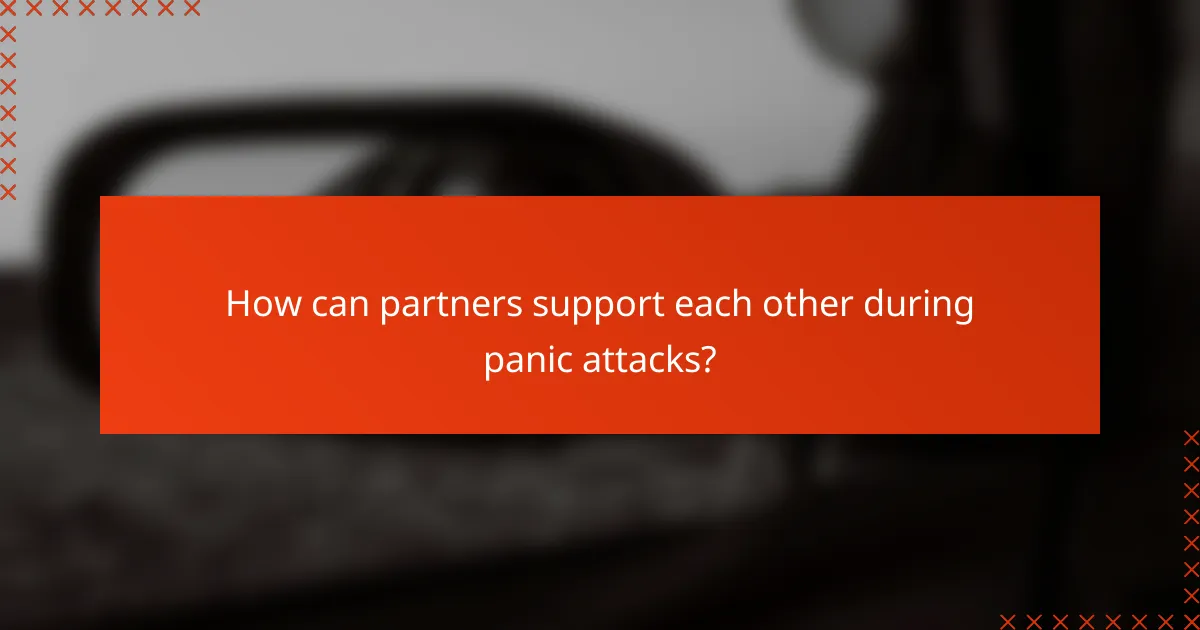
How can partners support each other during panic attacks?
Partners can support each other during panic attacks by fostering understanding and empathy. This involves clear communication, creating a safe space, and developing coping strategies together to navigate the challenges that arise during these episodes.
Establishing open dialogue
Open dialogue is crucial for partners to effectively support each other during panic attacks. This means discussing feelings, triggers, and responses in a non-judgmental manner. Regular check-ins can help both partners feel more comfortable sharing their experiences and emotions.
Consider setting aside time each week to talk about mental health. This can help normalize conversations about panic attacks and reduce stigma, making it easier to address issues as they arise.
Creating a safe environment
A safe environment is essential for managing panic attacks. This can involve physical space, such as a quiet room free from distractions, as well as emotional safety, where both partners feel secure expressing their feelings. Establishing ground rules for discussions during a panic attack can help maintain this safety.
For example, agree on a signal that indicates when one partner needs support or space. This can help prevent misunderstandings and ensure both partners are on the same page during stressful moments.
Learning coping strategies together
Learning coping strategies together can strengthen the partnership and improve responses to panic attacks. Techniques such as deep breathing, grounding exercises, or mindfulness can be practiced as a team. This not only provides immediate relief but also fosters a sense of unity.
Consider attending workshops or therapy sessions focused on anxiety management. This shared experience can enhance understanding and equip both partners with tools to handle panic attacks more effectively.

What role does therapy play in managing panic attacks in relationships?
Therapy plays a crucial role in managing panic attacks within relationships by providing tools for communication, trust-building, and support. It helps partners understand each other’s experiences and develop strategies to cope with the challenges that panic attacks can bring.
Couples therapy benefits
Couples therapy can significantly enhance communication between partners dealing with panic attacks. It creates a safe space for both individuals to express their feelings, fears, and frustrations, fostering empathy and understanding.
Additionally, therapy can help couples establish trust by addressing underlying issues that may exacerbate anxiety. Techniques learned in therapy can improve conflict resolution and strengthen the emotional bond, making it easier to navigate panic episodes together.
Individual therapy for panic management
Individual therapy focuses on equipping the person experiencing panic attacks with coping mechanisms and strategies tailored to their specific needs. Cognitive-behavioral therapy (CBT) is often effective, helping individuals identify triggers and modify their thought patterns.
Moreover, individual therapy allows for personal exploration of anxiety-related issues without the pressure of a partner’s presence. This can lead to greater self-awareness and empowerment, ultimately benefiting the relationship as the individual learns to manage their symptoms more effectively.
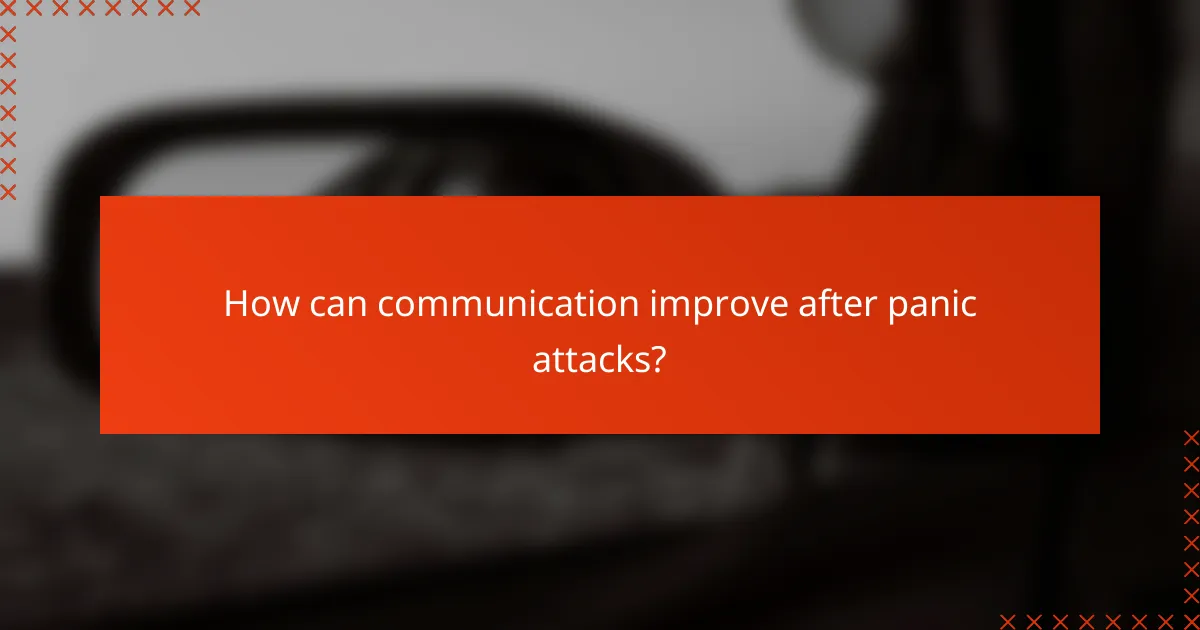
How can communication improve after panic attacks?
Improving communication after panic attacks is crucial for rebuilding trust and support in relationships. Open dialogue about feelings and experiences can foster understanding and strengthen connections between partners or friends.
Active listening techniques
Active listening involves fully concentrating on what the other person is saying, rather than just passively hearing their words. Techniques such as nodding, maintaining eye contact, and summarizing what has been said can help the speaker feel valued and understood. This approach encourages a safe space for discussing emotions related to panic attacks.
To practice active listening, avoid interrupting and resist the urge to offer immediate solutions. Instead, ask open-ended questions that invite further sharing, such as “How did that make you feel?” or “What do you need from me right now?” This can enhance emotional connection and trust.
Regular check-ins
Regular check-ins are essential for maintaining open lines of communication, especially after experiencing panic attacks. Setting aside time each week to discuss feelings, concerns, and progress can help both partners stay aligned and aware of each other’s emotional states. This proactive approach can prevent misunderstandings and reinforce support dynamics.
During these check-ins, create a comfortable environment where both individuals can express their thoughts without judgment. Use this time to explore any lingering fears or anxieties related to panic attacks, and discuss strategies for coping together. This practice not only strengthens the relationship but also promotes emotional resilience.

What are the long-term effects of panic attacks on relationships?
Panic attacks can significantly impact relationships over time, leading to communication issues, trust challenges, and altered support dynamics. Partners may struggle to understand each other’s experiences, which can create distance and misunderstandings.
Potential for relationship strain
The potential for relationship strain arises when one partner experiences frequent panic attacks, affecting both emotional and physical interactions. The partner without panic attacks may feel helpless or frustrated, leading to resentment or withdrawal.
Communication can break down as the partner with panic attacks may avoid discussing their feelings, fearing judgment or misunderstanding. This avoidance can create a cycle of isolation, where both partners feel unsupported and disconnected.
To mitigate strain, couples should prioritize open dialogue about feelings and experiences. Regular check-ins can help both partners express their needs and concerns, fostering a supportive environment.
